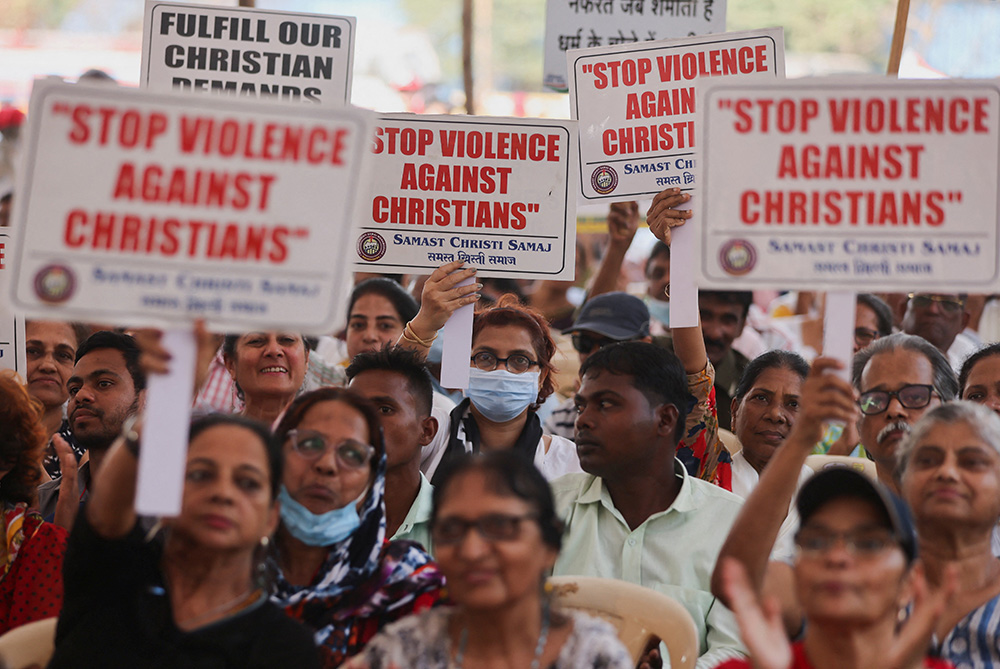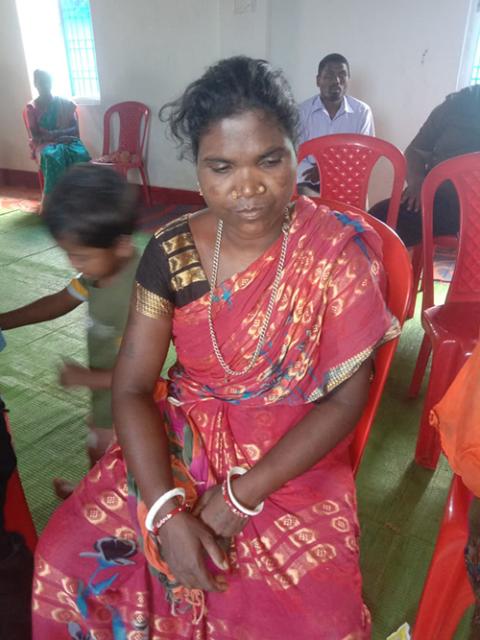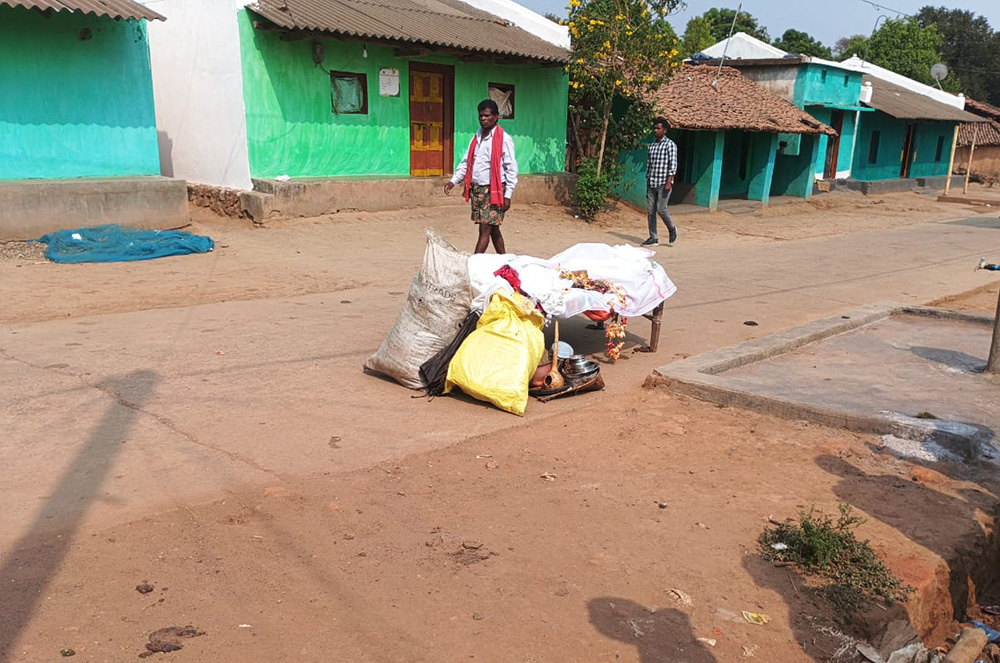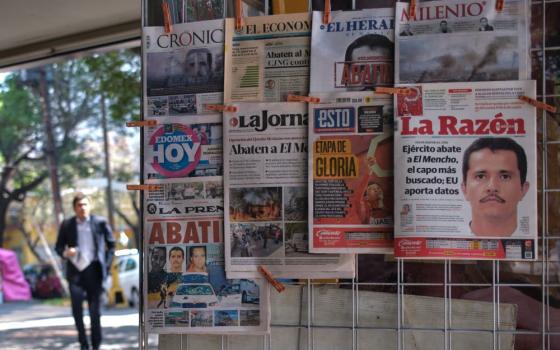
People hold placards during a protest in Mumbai, India, April 12, 2023, against what they claim are attacks on the Christian community, churches and institutions across India. (OSV News/Reuters/Francis Mascarenhas)
As a religious sister and advocate, I can no longer stay silent. My journey has long been marked by pain as I witness the suffering, injustice and hardship that define life in this region. Odisha, an eastern state rich in resources, remains home to some of India's poorest and most marginalized communities.
Despite producing national leaders, including India's current president, Droupadi Murmu, Odisha has become a battleground — not just of economic disparity, but of targeted violence and religious intolerance.
Before one wound heals, another tragedy strikes — ripping apart lives, destroying dignity and threatening faith. The suffering is not accidental; it is targeted. And the silence around it is deafening.

Sarawan Gond's mother is pictured in Raighar, Nabarangpur on April 27, 2025. "They beat us for our faith, vanished my son and now threaten our lives." (Courtesy of Sujata Jena)
Burial denied, bodies desecrated
On March 3, in Siunaguda village, Nabarangpur district, 75-year-old Kesab Santa's body lay in the street all day, denied burial because his children are Christians. Villagers demanded that the family reconvert to Hinduism. When they refused, they were cut off from electricity, water and government services — then driven away by death threats.
Weeks later, 19-year-old Sarwan Gond, a Christian migrant worker from Malbeda, died while digging a borewell in Maharashtra. His body arrived in his village on April 16, but burial in the common graveyard was blocked by villagers. His parents buried him on their land with legal permission. The next day, Hindu villagers dug up his body and burned it in the forest. His crime? Being Christian.
No one has been held responsible. The family, devastated by the death of their only son, now lives 90 kilometers away in fear and isolation. When even the dead aren't spared, what hope remains for the living?
Attacks on priests and minors
On March 22, three platoons of police barged into a Catholic Church in the Berhampur diocese. Minor girls cleaning the premises were beaten. Two priests were assaulted, verbally abused and robbed under false accusations of forced religious conversion. One young assistant priest suffered a broken shoulder.
Our fact-finding team from the Odisha Lawyers Forum of Religious and Priests Advocates documented the violations and filed complaints. No action has been taken. Instead, the victims were labeled as disturbers of the peace. In two incidents, families denied burial rights were summoned by magistrates for "breach of peace." No official police reports were filed for the assault on priests.

The body of Keshab Santa lies in the street after villagers denied him burial in Siunaguda, March 3, 2025. (Courtesy of Sujata Jena)
Sister detained for wearing her habit
On June 1, I received several distress calls and messages: a Catholic sister and four girls had been detained at the Khordha Road railway police station, 30 kilometers from our community. The sister was accused of forced religious conversion.
Deeply worried, I contacted Handmaids of Mary Sr. Clara D'Souza from our forum, and we rushed to the station. We met Sr. Rachana Nayak, a 29-year-old junior sister of the Holy Family Congregation, and four girls from the Berhampur diocese. They were en route to Jharsuguda to learn basic English before beginning candidacy formation.
Their journey began on May 31, boarding the Rourkela Rajarani Express. But Nayak's religious habit attracted attention. Bajrang Dal activists — a militant Hindu nationalist youth group — began trailing them. When one girl cried due to a headache, the mob twisted the situation: accusing the nun of trafficking minors and forced conversions.
At Khordha Road Railway Station, the mob stopped the train. Armed with loudspeakers and cameras, they dragged the sister and girls off. Neither authorities nor passengers intervened.
Around 11 p.m., they were taken to the Railway Protection Force post, where the Bajrang Dal made a complaint. During questioning, the mob dominated the room. The girls stated over and over they were Catholics by birth and traveling voluntarily, but were repeatedly interrupted and accused of lying.
When the sister messaged her superior for help, the mob noticed. A police officer reportedly snatched her phone. After over an hour of harassment, they were detained without legal grounds.
On June 1, they were taken to the Government Railway Police Force office at 8 a.m. Their parents arrived too. Outside, the mob and media harassed them for hours, shouting threats — "We will burn you and kill you" — and trying to coerce the girls into denying their faith.
By midafternoon, the tension had not ceased. D'Souza, High Court advocate Sebati Soren and I reached the police office around 2 p.m. We found Nayak and the girls distressed and traumatized. We demanded their release and questioned the basis of their detention. Deputy Superintendent of Police Aditya Kumar Sethi promised cooperation. He agreed to a police escort.
They were released around 6 p.m. A woman havildar and constable escorted us to Bhubaneswar. Nayak's superiors traveled over 12 hours from Chhattisgarh to meet her. That night, we welcomed them into our community. I experienced deep joy in helping release a sister and young girls from illegal detention. Tears, warm embraces and whispered prayers marked their reunion.
The girls and their parents were escorted home to Gajapati district. Later, Nayak expressed deep regret and said the incident might have been avoided had she not worn her religious habit. It was a painful statement, and one that challenges all of us in religious life. This incident sends a clear message to congregations to urgently reconsider their decision on travel dress. But how far do we go in adapting to fear?
My journey has long been marked by pain as I witness the suffering, injustice and hardship that define life in this region.
This was not an isolated case. In 2021, two sisters from Odisha were harassed on the Utkal Express. In 2023, a sister was harassed on a public bus in Meghalaya. In every case, the target was visible faith.
Even a police officer asked: "Why can't she dress like any other woman?"
But our religious identity isn't just in dress — it's in our convictions and our commitment to Christ's teachings: love, justice and compassion.
Still, the question lingers: should congregations adapt to avoid violence — or should we confront the rising intolerance head-on?
India's Constitution guarantees freedom of religion (Article 25), movement (Article 19) and life with dignity (Article 21). All these were violated in the cases I witnessed. The Indian Penal Code prohibits communal incitement, criminal intimidation, defamation and unlawful restraint. These laws exist — but are rarely applied when Christians are targeted.
Why are we silent?
This was the first time we, as advocate-sisters, directly intervened to rescue and support a sister. It brought deep meaning to our vocation. But how long can a few of us continue this fight alone? Where are the institutional responses, the national outrage, the church's collective voice?
We must pursue formal complaints, legal action and public advocacy — not only for Sr. Rachana Nayak and the persecuted families in Odisha, but for every person whose faith is used against them. Justice delayed must not become justice denied.
These stories are not exceptions. They expose systemic rot — fueled by religious intolerance and legal apathy. If we remain silent, we are complicit.
I share these stories with the hope that someone will listen, that someone will act. That the world will see these hidden wounds and respond — not with pity, but with solidarity.
Faith should never be a reason to be buried in shame, beaten in sacred spaces or branded a criminal for simply being visible. Until justice is delivered and dignity restored, our work must continue.






